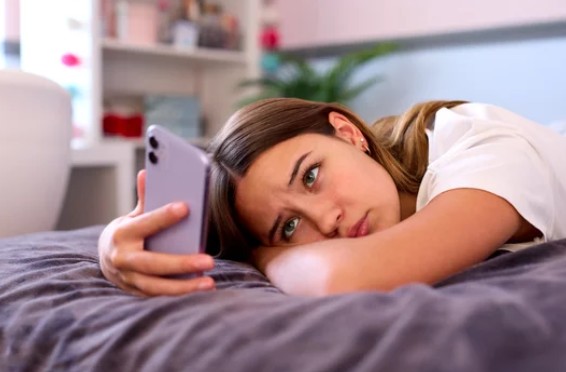This nonprofit is a 501(c)(3) tax exempt organization
Social Media Use & Happiness, or Lack There Of...
Below is a summary of recent studies and statistics that explore the relationship between social media use, happiness, and mental health outcomes, including the need for therapy or mental health support. The data is drawn from peer-reviewed studies and reputable sources, focusing on quantitative findings where available.


1. Social Media Use and Depression Risk (UK Millennium Cohort Study, 2019)
Statistic: Adolescents aged 12–15 who spent more than 3 hours per day on social media faced double the risk of experiencing poor mental health outcomes, including symptoms of depression and anxiety. Girls reported higher depressive symptom scores (geometric mean score 4.6 vs. 2.5 for boys). Over 43% of girls used social media for 3+ hours daily compared to 21.9% of boys.
Implication for Happiness: Heavy social media use was associated with poor sleep, online harassment, low self-esteem, and poor body image, all of which were linked to higher depressive symptoms, potentially reducing happiness.
Therapy Needs: The study suggests that heavy social media use may increase the need for mental health interventions due to its association with depressive symptoms and related factors like sleep disruption.
Source: Kelly, Y., et al. (2019). Social Media Use and Adolescent Mental Health: Findings From the UK Millennium Cohort Study. eClinicalMedicine.
2. Limiting Social Media Use and Mental Health Outcomes (Randomized Controlled Trials, 2022–2023)
Statistic: A randomized controlled trial with college-aged youth found that limiting social media use to 30 minutes daily for three weeks reduced depression severity by over 35% for those with high baseline depression levels. Another trial showed that deactivating a social media platform for four weeks improved subjective well-being (happiness, life satisfaction, reduced depression, and anxiety) by 25–40% compared to psychological interventions like self-help therapy.
Implication for Happiness: Reducing social media use significantly boosts happiness and life satisfaction, suggesting that excessive use may detract from well-being.
Therapy Needs: The reduction in depression and anxiety symptoms from limiting social media use indicates that moderated use could decrease the demand for therapy among heavy users.
Source: Social Media Has Both Positive and Negative Impacts on Children and Adolescents. (2023). NCBI Bookshelf.
3. Problematic Social Media Use (PSMU) and Happiness (Italian Adolescents, 2022)
Statistic: A study of 58,976 Italian adolescents (mean age 13.6) found that problematic social media use (PSMU) was negatively associated with happiness, mediated by lifestyle habits. Specifically, PSMU led to reduced physical activity (β = −0.012, p < 0.001) and increased sleep difficulties (β = −0.037, p < 0.001), both of which lowered happiness.
Implication for Happiness: Excessive or problematic social media use disrupts healthy lifestyle habits, indirectly reducing happiness by affecting sleep and physical activity.
Therapy Needs: The link between PSMU and reduced happiness suggests that adolescents with problematic use may require therapeutic interventions to address sleep issues and promote healthier habits.
Source: Marciano, L., et al. (2022). The Effect of Problematic Social Media Use on Happiness among Adolescents: The Mediating Role of Lifestyle Habits. PMC.
4. Social Media Use and Well-Being (Meta-Analysis, 2024)
Statistic: A meta-analysis of 78 studies (2009–2022) found that the association between social media use and positive well-being (hedonic, eudaimonic, and social) had effect sizes close to zero when social media use was broadly defined. However, specific activities (e.g., active communication vs. passive scrolling) showed larger effect sizes, with active use linked to slight increases in well-being and problematic use linked to decreases.
Implication for Happiness: The type of social media use matters—active engagement (e.g., messaging friends) may enhance happiness, while passive consumption or problematic use may reduce it.
Therapy Needs: Problematic use, such as compulsive scrolling or social comparison, may increase the need for mental health support, particularly for adolescents and young adults.
Source: Does Social Media Use Make Us Happy? A Meta-Analysis on Social Media and Positive Well-Being Outcomes. (2024). ScienceDirect.
5. Social Media and Mental Health Risks (Systematic Review, 2020)
Statistic: A systematic review of 50 studies found a 70% increase in self-reported depressive symptoms among heavy social media users. Adolescents spending excessive time on social media were more likely to experience symptoms of major depression, particularly due to image management and social comparison.
Implication for Happiness: Heavy social media use, especially when focused on curated images or social comparison, reduces happiness by fostering feelings of inadequacy and psychological distress.
Therapy Needs: The increased depressive symptoms suggest a higher likelihood of needing therapy, especially for adolescents engaging in image-focused social media activities.
Source: Kross, E., et al. (2020). Social Media Use and Its Connection to Mental Health: A Systematic Review. PMC.
6. Social Media Use and Positive Outcomes (Harvard Study, 2020)
Statistic: Routine social media use (e.g., as part of daily activities) was positively associated with social well-being, positive mental health, and self-rated health in a nationally representative sample. However, emotional over-connection to platforms was linked to poorer mental health outcomes.
Implication for Happiness: Moderate, routine social media use can enhance happiness through social connections, but excessive emotional attachment may reduce it.
Therapy Needs: Individuals overly attached to social media may require therapy to address compulsive behaviors and promote healthier usage patterns.
Source: Bekalu, M. A., et al. (2020). Social Media Use Can Be Positive for Mental Health and Well-Being. Harvard T.H. Chan School of Public Health.
7. Social Media and Therapy Access (2020)
Statistic: A survey of social media users with mental illness found that most respondents were interested in accessing mental health programs through social media for symptom management and health promotion.
Implication for Happiness: Social media can serve as a platform for mental health support, potentially increasing happiness by providing access to peer support and resources.
Therapy Needs: The interest in social media-based interventions suggests that digital platforms could reduce barriers to therapy, particularly for those with serious mental illnesses.
Source: Naslund, J. A., et al. (2020). Social Media and Mental Health: Benefits, Risks, and Opportunities for Research and Practice. PMC.
8. Social Media Use During COVID-19 (2021)
Statistic: A study during COVID-19 confinement found that increased social media use was associated with lower happiness levels, particularly when usage increased compared to pre-confinement levels. Social comparison on platforms was a key factor.
Implication for Happiness: Heightened social media use during stressful periods like confinement exacerbates social comparison, reducing happiness.
Therapy Needs: Increased psychological distress from social comparison may necessitate therapeutic interventions to address feelings of inadequacy.
Source: Frontiers. (2021). Exploratory Study of the Relationship Between Happiness and the Rise of Media Consumption During COVID-19 Confinement.
Summary of Findings
Happiness: Social media use has a complex relationship with happiness. Moderate, active use (e.g., connecting with friends) can enhance happiness by fostering social connections, but heavy or problematic use (e.g., passive scrolling, social comparison) is consistently linked to reduced happiness due to increased depression, anxiety, and lower self-esteem. Specific activities like seeking external approval or engaging in image management amplify negative effects.
Therapy Needs: Heavy social media use, particularly problematic use, is associated with increased mental health issues (e.g., depression, anxiety, sleep disruption), suggesting a greater need for therapeutic interventions. Limiting social media use has shown significant reductions in depression and anxiety, potentially decreasing therapy demands. Social media platforms also offer opportunities for mental health support, which could meet therapy needs for some users.
Key Mediators: Sleep difficulties, reduced physical activity, social comparison, and cyberbullying mediate the negative effects of social media on happiness and mental health, increasing the likelihood of needing therapy.
Sources
Does Social Media Use Make Us Happy? A Meta-Analysis on Social Media and Positive Well-Being Outcomes. (2024). ScienceDirect.
Marciano, L., et al. (2022). The Effect of Problematic Social Media Use on Happiness among Adolescents: The Mediating Role of Lifestyle Habits. PMC.
Bekalu, M. A., et al. (2020). Social Media Use Can Be Positive for Mental Health and Well-Being. Harvard T.H. Chan School of Public Health.
Frontiers. (2021). Exploratory Study of the Relationship Between Happiness and the Rise of Media Consumption During COVID-19 Confinement.
Naslund, J. A., et al. (2020). Social Media and Mental Health: Benefits, Risks, and Opportunities for Research and Practice. PMC.
Social Media Has Both Positive and Negative Impacts on Children and Adolescents. (2023). NCBI Bookshelf.
Kross, E., et al. (2020). Social Media Use and Its Connection to Mental Health: A Systematic Review. PMC.
Kelly, Y., et al. (2019). Social Media Use and Adolescent Mental Health: Findings from the UK Millennium Cohort Study. eClinicalMedicine.
